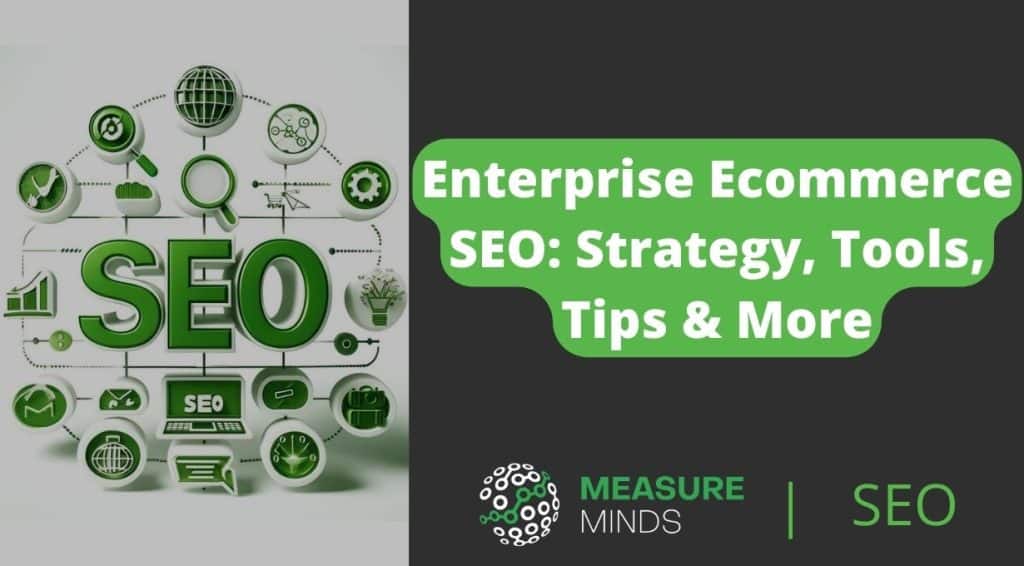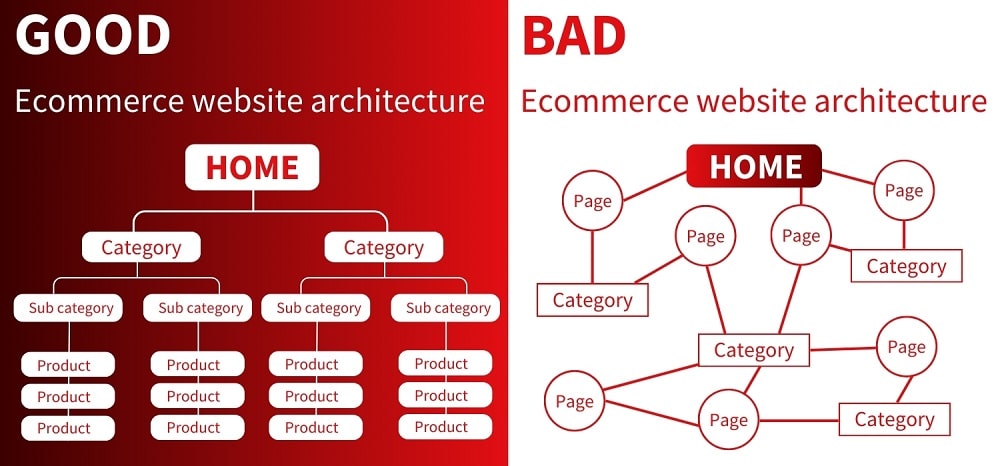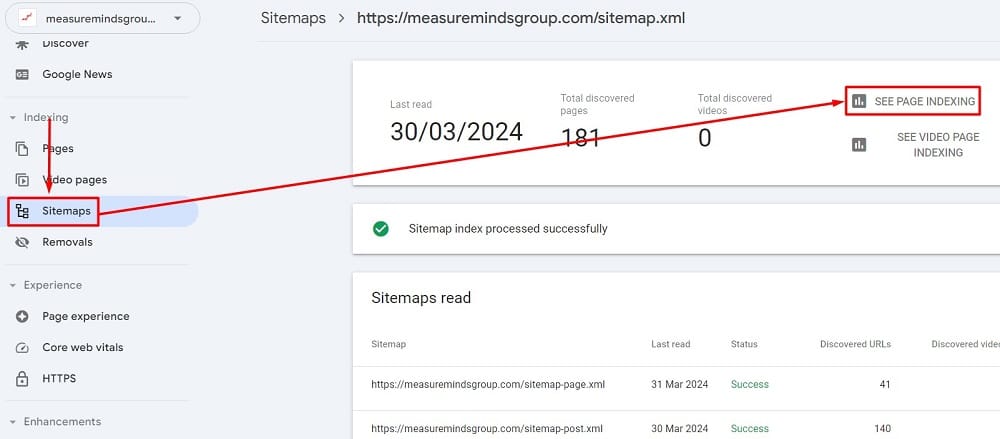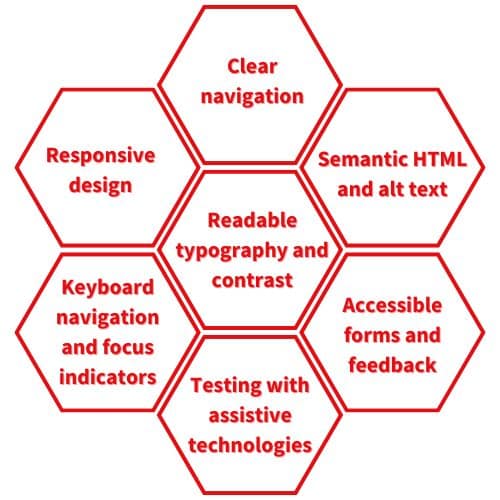
Enterprise Ecommerce SEO: Strategy, Tools, Tips & More
Enterprise eCommerce SEO is pivotal for retailers with international footprints aiming to improve their online presence and customer reach. It requires a nuanced approach, blending manual curation with strategic data integration, distinct from traditional SEO practices. Understanding and applying advanced SEO strategies is critical to standing out in a crowded digital world.
First I’m going to highlight the key factors the affect enterprise e-commerce SEO. Afterwards, I’ve collated nine expert opinions on strategy, tools and tips to help you improve!
Key enterprise ecommerce SEO factors
Several key factors are a must while devising an e-commerce SEO strategy. From site architecture to UX optimisation, understanding these elements is crucial for any enterprise looking to enhance its organic reach. Let’s explore the most important SEO factors that can set your eCommerce platform apart in a competitive digital market.
1. Website architecture
Website architecture is critical to making your site easy to navigate. It’s all about organising your site so everything is easy to find. If your site is hard to navigate, it’s not just users who struggle; search engines like Google will too. This can make your site less visible online.
Think of your site as a library. It should have clear categories and subcategories for everything. Everything must be easy to find, whether product pages or blogs.

For example, when you plan content for your blog, figure out the main topics or “buckets” your content fits into. This helps organise your site better. Use tools like MarketMuse or Scalenut to spot what’s missing in your SEO content plan. Once you know your needs, you can manage your site to fill those gaps.
2. Site discoverability
Making sure search engines and users can easily find content on your site is crucial. You can achieve that using internal links, external links, sitemaps, and internal site search wisely. Google decides how much time to spend looking at your site based on its authority. You don’t want to waste time on indexing unimportant files like JavaScript or CSS.
For big sites with lots of pages, this is a big deal. It’s essential to quickly guide Google to the critical content without using up its crawl budget. A handy tool for this is Google Search Console.
For example, you can check “Sitemaps” from your GSC account and then check the pages that are indexing. If you find any issues there, you can adjust your site settings with robots.txt to help Google find your most helpful content faster.

3. User experience
User experience (UX) can influence how your website ranks on Google. This includes everything from how easy it is to navigate your site to how quickly pages load. Google’s Page Experience algorithm evaluates these factors to determine where your pages appear in search results.

When organising your site, focus on the most valuable pages. Positioning important pages higher within your site’s hierarchy can enhance their chance to rank for competitive keywords. Your site should smoothly guide users from general information to specific, conversion-focused pages. This journey should help users move from learning about your product to purchasing.
Other usability factors include
- Pagespeed.
- Content layout and structure.
- Mobile friendliness – usually very important for e-commerce.
Expert recommendations: Strategies, tools, and tips for enterprise ecommerce SEO
Nine seasoned professionals, from SEO specialists to COOs, shared strategic approaches to bolstering SEO performance in enterprise e-commerce. Learn the essential expert-recommended SEO tools and tips to transform your e-commerce SEO efforts and boost your online reach.
- Establish topic authority.
- Develop sound technical SEO foundations.
- Optimise content and use SEO tools.
- Drive traffic with viral blog content.
- Conduct regular SEO and content audits.
- Enhance UX with site architecture.
- Leverage data analytics for SEO Insights.
- Implement a robust linking strategy.
- Maximise product page quality and relevance.
Topic authority is a critical factor for enterprise e-commerce. Most online stores go wide with their content, which lowers their authority on their product pages. If you make an exercise bike, for example, you should have 100 articles specifically about exercise bikes, not 100 articles about fitness.
Creating this authority improves your positioning for the “money pages,” which, in this case, is your exercise bike product page. To build a topic cluster, use tools such as Ahrefs, MarketMuse, and, of course, ChatGPT.
A bonus idea is to look at the keywords for which you are already ranking but do not have content specifically about. There is a lot of low-hanging fruit within e-commerce sites that they can and should capitalize on.
Jason Vaught, Director of Content, SmashBrand
Develop sound technical SEO foundations
Ensuring technically sound site architecture and development is foundational for enterprise e-commerce SEO. A clean URL structure, fast load speeds, and semantic HTML markup create the optimal crawler experience.
Investing in a robust CMS, or migrating legacy systems, is crucial for sound technical SEO. Critical tools include site crawlers like Screaming Frog to catch issues. Google Search Console and Google Lighthouse provide key audits. For managing URLs, MozBar helps avoid duplicates. Index management tools like Sistrix give visibility into indexing errors to address.
I recommend getting developers and SEOs to collaborate early in the build processes, not after launch. Aligning on an SEO roadmap unified with UX and engineering elevates performance. With large-scale e-commerce, cross-functional alignment on adhering to technical SEO best practices at the core avoids painful issues down the road. It powers a scalable foundation for long-term visibility and growth.
Vikrant Shaurya, CEO, Authors On Mission
Optimise content and use SEO tools
Generally speaking, so many people have jumped into e-commerce over the last few years, selling all kinds of products, and a tough sell is a tough sell, online or off.
Optimising a product is much like optimising a lawyer’s office or a blog—do your research and make sure the content is great. A blog post might bring traffic, but what’s the user’s intent? Good blog content can attract links, and that always makes things easier. Make the most of the expertise of the vendor.
As for essential tools, Ahrefs and SEMrush are both fine. And to my knowledge, there is no “ideal for an e-commerce site” keyword tool.
Personally, I use Ahrefs more for keyword research, and for technical SEO, you can use Google Search Console or the free Ahrefs page crawler.
Jugnu Nagar, SEO Specialist, Help In Homework
I would recommend that enterprise e-commerce websites focus on launching a blog and creating viral content. Blog articles are an often underestimated source of targeted traffic, particularly for e-commerce websites.
If your company sells coffee makers, consider creating an article featuring coffee statistics. If the article is high-quality and helpful, it will get plenty of reposts. As a result, your e-commerce website traffic will increase, which will significantly boost your sales.
Additionally, I’d suggest diversifying your website traffic. For instance, creating a Pinterest page for a company that sells goods for women can be beneficial. Pinterest’s userbase is almost 70% female. This platform could become an excellent source of targeted traffic for your e-commerce website.
Dmytro Sokhach, SEO Expert, CEO and Co-Founder, Editorial.Link
Conduct regular SEO and content audits
With large enterprise e-commerce websites, regularly optimising the technical and on-page SEO is crucial to ensure continued high website performance. The addition and SEO optimisation of new web pages have to go hand in hand.
Scheduled SEO audits can help spot and fix any issues that may hamper website performance. This includes monitoring the internal linking structure, website speed and architecture, keyword optimisation, user experience, mobile responsiveness, etc.
Maintain a repository of tools that help evaluate the website from all angles. For example, while a tool like Hotjar can help understand how the audience is interacting with the website content, tools like SEMrush or Moz can help track things like keyword performance and backlink profile.
Besides these aspects, not leveraging content marketing for enterprise e-commerce is a missed opportunity for ranking high. So, create plenty of targeted blog posts, how-to guides, product demos/tutorials, etc.
Astha Verma, Co-Founder and CEO, WrittenlyHub
Enhance UX with site architecture
A well-structured site with a clear hierarchy not only helps search engines crawl and index content more effectively but also enhances the user experience, which is increasingly important for SEO rankings.
Hotjar is an excellent tool for enhancing the strategic approach of focusing on site architecture and user experience in enterprise e-commerce. It provides heat mapping and user behavior analytics, which are invaluable for understanding how users interact with your website.
John Cammidge, Google Ads Expert, John Cammidge Consultants
Leverage data analytics for SEO Insights
One critical SEO skill that really moves the needle is data analytics proficiency. It’s not just about understanding SEO basics; it’s about diving deep into data to uncover insights that drive strategy.
Using data analytics, our team could understand user behavior, identify patterns, and tailor our content strategy. We once noticed a particular set of keywords performing well but realised they weren’t fully exploited in our content. We refined our keyword strategy, focusing on these high-potential terms and optimising existing content.
The impact was a 30% increase in organic traffic and improved search rankings. It’s a testament to how data-driven decisions can enhance not just SEO performance but also overall team efficiency.
Zephyr Chan, Founder and Growth Marketer, Better Marketer
Implement a robust linking strategy
Strategically linking from high-authority pages to important product pages helps distribute authority throughout your site, positively impacting their rankings. Descriptive and relevant anchor text should be used to provide search engines with context about the linked page’s content.
For example, if there is a blog post about a particular product category, linking from that post to relevant product pages within the category can be beneficial.
Google Search Console can be utilised to analyse a site’s internal linking structure and identify any issues. Additionally, creating a “Related Products” or “You May Also Like” section on product pages can improve internal linking and encourage users to explore and potentially make additional purchases.
Campbell Tourgis, Executive Vice President and Chief Operating Officer, Wainbee
Maximise product page quality and relevance
One critical strategic approach in enterprise e-commerce that significantly impacts SEO performance is optimising product pages with relevant and high-quality content.
Ensure product descriptions are detailed, use relevant keywords, and provide valuable information to users. Essential tools for this strategy include keyword research tools like SEMrush or Ahrefs. Tip: Regularly update and refresh content to stay relevant in search engine rankings.
John Frigo, e-commerce Manager, Best Price Nutrition
Need Help with Enterprise ECommerce SEO?
Handling SEO for large-scale eCommerce enterprises is complex. It involves managing millions of pages and keeping up with Google’s algorithm changes. Results can take time. You also need a reasonable budget, technical skills, and teamwork across marketing departments. Your goal is to make your brand stand out online.
MeasureMinds Group offers specialised enterprise SEO services to address these challenges. Our team crafts custom strategies, scales your content, and performs regular audits to keep your SEO on track. Partner with us for more innovative & effective SEO that elevates your brand.
- A Guide to Integrating GTM Server-Side & Conversions API - 10/07/2024
- How to Backup Universal Analytics Data Easily - 28/06/2024
- Google Analytics vs Snowplow: Should you Switch? - 28/06/2024








